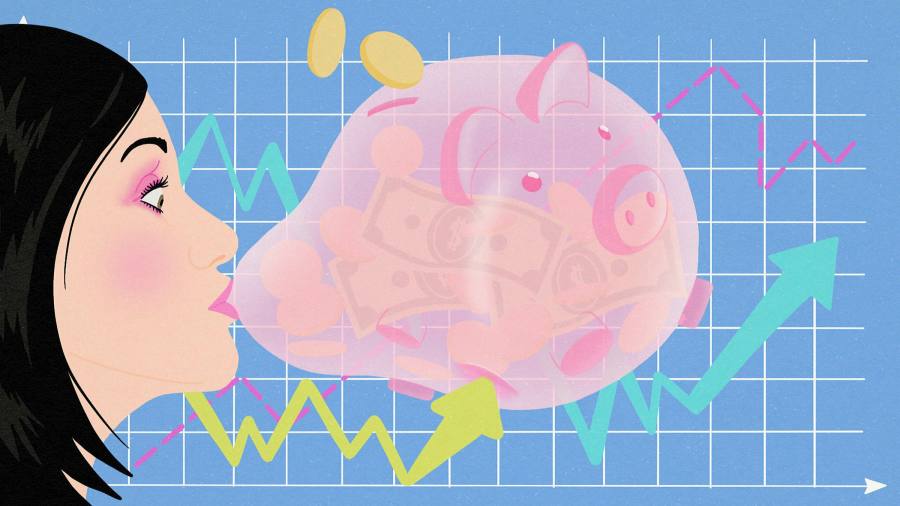The writer is editor-in-chief of MoneyWeek
For those confused by the market this year, I have a suggestion. Invest in the Practical History of Financial Markets course run by the Edinburgh Business School (you can do it online — no need to come to chilly Scotland). One of the modules focuses on the history of extreme market valuations — what causes them and what crashes them.
The first thing to note is that, while we love to talk about bubbles, periods of extreme valuation in the stock market don’t really happen very often. Of the 29 business cycles in the US since 1881 only a few have ended in one, according to Professor Russell Napier. But, while each has had its own peculiarities, the basic driver has been much the same: the ability of investors to believe absolutely in something that always turns out to be impossible. Namely that, thanks to some “marvels” of technology, corporate profits will stay high (and probably rise) indefinitely and that interest rates will also stay low indefinitely.
In most cycles investors do not think this. They assume cyclical normality — that fast economic growth will lead to capacity constraints and then to inflation and rate rises, something that would slow both economic growth and crimp corporate profits — bringing down valuations. We like to think of equities as all sorts of things: right now, for example, all too many investors think of them primarily as virtue signalling vehicles (witness the now collapsing bubble in renewable energy stocks).
But long term, equities aren’t really about feelings or show ponying: they are about the net present value of all future income streams discounted at whatever the discount rate is at the time. That’s it. So discount rate up, value down (usually when inflation hits about 4 per cent).
A proper bubble can then only develop if investors do not assume cyclical normality but instead manage to convince themselves (against all historical experience) that it is possible for a high-profit, low-inflation environment to be permanent. This always ends badly. Think 1901, 1921, 1929, 1966, 2000, 2007, briefly 2020 and possibly right now.
The only question is how fast it ends badly. The key thing here, says Napier in his lectures, is which bit of the equation investors have been getting wrong. If it is the belief that interest rates will never rise, you tend to get a long drawn out bear market (from 1966, when it would have been hard to imagine the inflation of the late 1970s). If it is more the belief that corporate earnings will stay high forever, it tends to be shorter and sharper (2020 was a mini classic of this genre of crash).
So here we are. Inflation has been minimal for years. US corporate profits have been very high and rising for years: they hit yet another record high in the third quarter of 2021. And of course, as a result, US stock market valuations hit bubble levels some time ago: by the end of last year the cyclically adjusted price-to-earnings ratio was knocking at about 40, more than double its long-term average. Investors have once again been believing too many impossible things before breakfast — something they might be starting to realise.
So here’s the question: which bit have we got most wrong this time around. Is it the discount rate or corporate profits? The discount rate feels like the obvious one, although rising interest rates obviously hit corporate margins too.
Cheap labour and globalisation long ago made inflation no more than a distant nightmare for older investors and a mystery to younger ones. Most thus fell for the nonsense from central banks last year that the fast-rising inflation they were seeing was transitory. And even those that thought it might last beyond, say, Easter still believed that central banks would hold off raising rates regardless.
So the fact that high growth (US gross domestic product grew by 6.9 per cent in the last quarter of 2021) really can slam into capacity constraints and create inflation rates starting with sevens is turning out to be a horrible shock — as are the indications that central banks might actually do something about it.
The Federal Reserve, under pressure from the inflation itself and possibly also from polls suggesting that said inflation is not helping President Joe Biden, is now changing tune (no more “transitory”). There is even, says Aegon Asset Management, “a reasonable probability of seven rate hikes this year, one at each meeting”. Illusion-shattering stuff.
It also leaves investors with little choice: as long as the Fed holds this line they should surely not buy dips but sell rallies — at least when it comes to their most expensive holdings (we can argue about whether the likes of Peloton, down 80 per cent in six months, is still expensive or not). In inflationary times, value today starts to look like it might be worth more than possible value tomorrow (a bird in the hand is worth a lot more than an electric flying car in the bush).
With that in mind, it is worth noting that the FTSE 100, with its reasonably valued income generating stocks, is outperforming the S&P 500 — so much so that it is now on track to have outperformed over a 12-month period by the end of this month. That’s something it hasn’t done for a full year since May 2017. But it is a switch I suspect most Practical History of Financial Markets students were ready for.










